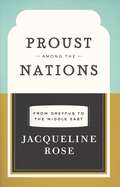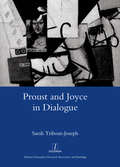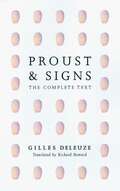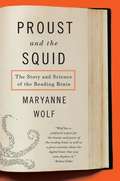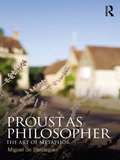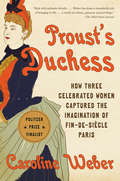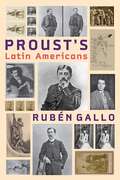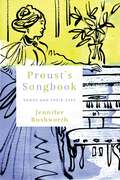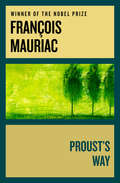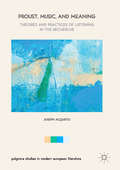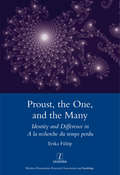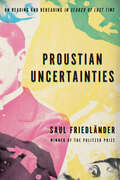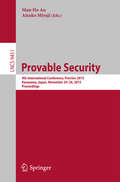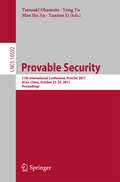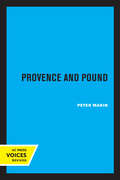- Table View
- List View
Proust among the Nations: From Dreyfus to the Middle East
by Jacqueline RoseKnown for her far-reaching examinations of psychoanalysis, literature, and politics, Jacqueline Rose has in recent years turned her attention to the Israel-Palestine conflict, one of the most enduring and apparently intractable conflicts of our time. In Proust among the Nations, she takes the development of her thought on this crisis a stage further, revealing it as a distinctly Western problem. In a radical rereading of the Dreyfus affair through the lens of Marcel Proust in dialogue with Freud, Rose offers a fresh and nuanced account of the rise of Jewish nationalism and the subsequent creation of Israel. Following Proust's heirs, Beckett and Genet, and a host of Middle Eastern writers, artists, and filmmakers, Rose traces the shifting dynamic of memory and identity across the crucial and ongoing cultural links between Europe and Palestine. A powerful and elegant analysis of the responsibility of writing, Proust among the Nations makes the case for literature as a unique resource for understanding political struggle and gives us new ways to think creatively about the violence in the Middle East.
Proust among the Nations: From Dreyfus to the Middle East
by Jacqueline RoseKnown for her far-reaching examinations of psychoanalysis, literature, and politics, Jacqueline Rose has in recent years turned her attention to the Israel-Palestine conflict, one of the most enduring and apparently intractable conflicts of our time. In Proust among the Nations, she takes the development of her thought on this crisis a stage further, revealing it as a distinctly Western problem.In a radical rereading of the Dreyfus affair through the lens of Marcel Proust in dialogue with Freud, Rose offers a fresh and nuanced account of the rise of Jewish nationalism and the subsequent creation of Israel. Following Proust’s heirs, Beckett and Genet, and a host of Middle Eastern writers, artists, and filmmakers, Rose traces the shifting dynamic of memory and identity across the crucial and ongoing cultural links between Europe and Palestine. A powerful and elegant analysis of the responsibility of writing, Proust among the Nations makes the case for literature as a unique resource for understanding political struggle and gives us new ways to think creatively about the violence in the Middle East.
Proust and Joyce in Dialogue
by Sarah Tribout-JosephIt might reasonably be asked what the connection is between Francoises malapropisms in Proust and the erudite allusions of Stephens interior monologue in Joyce. Tribout-Joseph argues that they are indeed interrelated. Proust and Joyce are exemplary of Modernisms reconciliation of high literature with popular voices. Both writers explore the process of incorporation, the interface between speech and narrative. Fragments of discourse are taken from diverse sources and reoriented within new contexts. Proposed here are interconnected close readings of socio-political debate, body talk, listening processes, silences, intertextual echoes, cliche, register, conflated voices, chatter, gossip, eavesdropping, internalized debate, and misunderstandings which allow for a new configuration of the authors to emerge.
Proust and Signs (Theory Out Of Bounds Ser. #17)
by Gilles DeleuzeThe essential work on Proust--now in paperback! In a remarkable instance of literary and philosophical interpretation, the incomparable Gilles Deleuze reads Marcel Proust's work as a narrative of an apprenticeship--more precisely, the apprenticeship of a man of letters. Considering the search to be one directed by an experience of signs, in which the protagonist learns to interpret and decode the kinds and types of symbols that surround him, Deleuze conducts us on a corollary search--one that leads to a new understanding of the signs that constitute A la recherche du temps perdu. In Richard Howard's graceful translation, augmented with an essay that Deleuze added to a later French edition, Proust and Signs is the complete English version of this work. Admired as an imaginative and innovative study of Proust and as one of Deleuze's more accessible works, Proust and Signs stands as the writer's most sustained attempt to understand and explain the work of art.
Proust and the Arts
by Christie Mcdonald McDonald, Christie and Proulx, François François ProulxProust and the Arts brings together expert Proustians and renowned interdisciplinary scholars in a major reconsideration of the novelist's relation to the arts. Going beyond the classic question of the models used by Proust for his fictional artists, the essays collected here explore how he learned from and integrated, in highly personal ways, the work of such creators as Wagner or Carpaccio. This volume reveals the breadth of Proust's engagement with varied art forms from different eras: from "primitive" arts to sound recordings, from medieval sculpture to Art Nouveau glassmaking, from portrait photography to the private art of doodling. Chapters bring into focus issues of perception and detail in examining how Proust encountered and responded to works of art, and attend to the ways art shaped his complex relationship to identity, sexuality, humor, and the craft of writing.
Proust and the Squid: The Story and Science of the Reading Brain
by Maryanne WolfMany scholars believe that humans are hard-wired for language, but no one, points out Wolf (child development, Tufts U.), believes that about reading and writing. The act of reading is not natural, she argues, either for a child or in the evolution of the brain's capacity to learn. She loves it anyway, and here shares her knowledge and joy at learning to read in both evolutionary and development contexts; she also explores reasons that some people cannot learn to read. By the way, Proust says they were just friends; the squid is not commenting.
Proust and the Squid: The Story and Science of the Reading Brain
by Maryanne Wolf"Human beings were never born to read," writes Tufts University cognitive neuroscientist and child development expert Maryanne Wolf. <P><P>Reading is a human invention that reflects how the brain rearranges itself to learn something new. <P><P>In this ambitious, provocative book, Wolf chronicles the remarkable journey of the reading brain not only over the past five thousand years, since writing began, but also over the course of a single child's life, showing in the process why children with dyslexia have reading difficulties and singular gifts. <P><P>Lively, erudite, and rich with examples, Proust and the Squid asserts that the brain that examined the tiny clay tablets of the Sumerians was a very different brain from the one that is immersed in today's technology-driven literacy. <P><P>The potential transformations in this changed reading brain, Wolf argues, have profound implications for every child and for the intellectual development of our species.
Proust as Philosopher: The Art of Metaphor
by Miguel de BeisteguiMarcel Proust’s In Search of Lost Time has long fascinated philosophers for its complex accounts of time, personal identity and narrative, amongst many other themes. Proust as Philosopher: The Art of Metaphor is the first book to try and connect Proust’s implicit ontology of experience with the question of style, and of metaphor in particular. Miguel de Beistegui begins with an observation: throughout In Search of Lost Time, the two main characters seem prone to chronic dissatisfaction in matters of love, friendship and even art. Reality always falls short of expectation. At the same time, the narrator experiences unexpected bouts of intense elation, the cause and meaning of which remain elusive. Beistegui argues we should understand these experiences as acts of artistic creation, and that this is why Proust himself wrote that true life is the life of art. He goes on to explore the nature of these joyful and pleasurable experiences and the transformation required of art, and particularly literature, if it is to incorporate them. He concludes that Proust revolutionises the idea of metaphor, extending beyond the confines of language to understand the nature of lived, bodily experience.
Proust at the Movies (Studies in European Cultural Transition #31)
by Martine Beugnet Marion SchmidFilm established itself as an artistic form of expression at the same time that Proust started work on his masterpiece, A la recherche du temps perdu. If Proust apparently took little interest in what he described as a poor avatar of reductive, mimetic representation, the resonances between his own radical reworking of writing styles and the novelistic forms, and cinema as the art of time are undeniable. Proust at the Movies is the first study in English to consider these rich interconnections. Its introductory chapter charts the missed encounter between Proust and the cinema and addresses the problems inherent in adapting his novel to the screen. The following chapters examine the various cinematic responses to A la recherche du temps perdu attempted to date: Luchino Visconti and Joseph Losey's failed attempts at adapting the whole of the novel in the 1970s, Volker Schlöndorff's Un Amour de Swann (1984), Raoul Ruiz's Le Temps retrouvé (1999), Chantal Akerman's La Prisonnière in La Captive (2000), and Fabio Carpi's Quartetto Basileus (1982) and Le Intermittenze del cuore (2003). The last chapter tracks the echoes of Proust's writing in the work of various directors, from Abel Grace to Jean-Luc Godard. The approach is multidisciplinary, combining literary criticism with film theory and elements of philosophy of art. Special attention is given to the modernist legacy in literature and film with its distinctive aesthetic and narrative features. An outline of the history and recent evolution of contemporary art cinema thus emerges: a cinema where the themes at the heart of Proust's work - memory, time, perception - are ceaselessly explored.
Proust in Love
by William C. CarterThe acclaimed Proust biographer William C. Carter portrays Proust's amorous adventures and misadventures from adolescence through his adult years, supplying where appropriate Proust's own sensitive, intelligent, and often disillusioned observations about love and sexuality. Proust is revealed as a man agonizingly caught between the constant fear of public exposure as a homosexual and the need to find and express love. In telling the story of Proust in love, Carter also shows how the author's experiences became major themes in his novelIn Search of Lost Time. Carter discusses Proust's adolescent sexual experiences, his disastrous brothel visit to cure homosexual inclinations, and his first great loves. He also addresses the duel Proust fought after the journalist Jean Lorrain alluded to his homosexuality in print, his flirtations with respectable women and high-class prostitutes, and his affairs with young men of the servant class. With new revelations about Proust's love life and a gallery of photographs, the book provides an unprecedented glimpse of Proust's gay Paris.
Proust's Cup of Tea: Homoeroticism and Victorian Culture (Studies in European Cultural Transition #15)
by Emily EellsProust's Cup of Tea analyzes Proust's reading of various Victorian authors and shows how they contributed to A la recherche du temps perdu. This book proves that British literature and art played a fundamental role in Proust's writing process by citing from the manuscript versions of his novel, as well as from his correspondence, essays and the lengthy critical appartus accompanying his translations of Ruskin. Eells reflects here on why Proust was attracted to Victorian culture, and how he incorporated it into his novel. The works of the British novelists he was most interested in-Thomas Hardy and George Eliot-address questions of gender which Proust develops in his own work. He builds Sodome et Gomorrhe I, the section of his novel focusing on homosexuality, on a series of explicit citations and guarded allusions to Shakespeare, Darwin Walter Scott, Oscar Wilde and Robert Louis Stevenson. Eells explores how Proust followed in the pioneering footsteps of those British writers who had ventured beyond the boundaries of conventional sexuality, though he took pains to erase their traces in the definitive version of his work. This study also highlights how Proust made his fictitious painter Elstir into a master of ambiguity, by modeling his art on Turner, the Pre-Raphaelites and Whistler. Eells shows that Proust drew on Victorian culture in his depiction of sexual ambiguity, arguing that he confounded eroticism and aestheticism in the way he inextricably linked the man-woman figure with British art and literature. As Proust aestheticized male and female homosexuality using references to British art and letters, Eells coins the term 'Anglosexuality' to refer to his characters of the third sex. She defines Anglosexuality as an intersexuality represented through intertextuality, as an artistic sensitivity, an aesthetic stance, and a new way of seeing. Proust's Cup of Tea thus demonstrates that Victorian culture and homoeroticism form one of the cornerstones of Proust's monumental work.
Proust's Deadline
by Christine M. CanoMarcel Proust's multivolume masterpiece, À la recherche du temps perdu, began to appear in 1913. Over the next fifty years, it gained a reputation as one of the greatest literary works of the twentieth century. But the novel's classic image as a completed work was later shattered by the discovery of unpublished drafts, and the "war of the Prousts" has kept scholars arguing over its definitive form ever since. Christine M. Cano's Proust's Deadline presents a concise history of the publishing and reception of À la recherche du temps perdu, and sorts out the most important issues that have arisen from the ensuing debates about the text. She ultimately shows how this quintessential "book about time" tells another story about time's passage: the story of Proust's mortal confrontation with the temporality of writing, publishing, and reading.
Proust's Duchess: How Three Celebrated Women Captured the Imagination of Fin-de-Siecle Paris
by Caroline WeberFrom the author of the acclaimed Queen of Fashion--a brilliant look at the glittering world of turn-of-the-century Paris through the first in-depth study of the three women Proust used to create his supreme fictional character, the Duchesse de Guermantes.Geneviève Halévy Bizet Straus; Laure de Sade, Comtesse de Adhéaume de Chevigné; and Élisabeth de Riquet de Caraman-Chimay, the Comtesse Greffulhe--these were the three superstars of fin-de-siècle Parisian high society who, as Caroline Weber says, "transformed themselves, and were transformed by those around them, into living legends: paragons of elegance, nobility, and style." All well but unhappily married, these women sought freedom and fulfillment by reinventing themselves, between the 1870s and 1890s, as icons. At their fabled salons, they inspired the creativity of several generations of writers, visual artists, composers, designers, and journalists. Against a rich historical backdrop, Weber takes the reader into these women's daily lives of masked balls, hunts, dinners, court visits, nights at the opera or theater. But we see as well the loneliness, rigid social rules, and loveless, arranged marriages that constricted these women's lives. Proust, as a twenty-year-old law student in 1892, would worship them from afar, and later meet them and create his celebrated composite character for The Remembrance of Things Past.
Proust's Latin Americans (Hopkins Studies in Modernism)
by Rubén GalloThe first discussion of Proust’s circle of Latin American friends, lovers, and literary models.Part biography, part cultural history, part literary study, Rubén Gallo's book explores the presence of Latin America in Proust's life and work. The novelist lived in an era shaped by French colonial expansion into the Americas: just before his birth, Napoleon III installed Maximilian as emperor of Mexico, and during the 1890s France was shaken by the Panama Affair, a financial scandal linked to the construction of the canal in which thousands of French citizens lost their life savings.It was in the context of these tense Franco–Latin American relations that the novelist met the circle of friends discussed in Proust's Latin Americans: the composer Reynaldo Hahn, Proust’s Venezuelan lover; Gabriel de Yturri, an Argentinean dandy; José-Maria de Heredia, a Cuban poet and early literary model; Antonio de La Gandara, a Mexican society painter; and Ramon Fernandez, a brilliant Mexican critic turned Nazi sympathizer.Gallo discusses the correspondence—some of it never before published—between the novelist and this heterogeneous group and also presents insightful readings of In Search of Lost Time that posit Latin America as the novel’s political unconscious. Proust’s speculation with Mexican stocks informed his various fictional passages devoted to financial transactions, and the Panama Affair shaped his understanding of the conquest of America in a little-known early text.Proust's Latin Americans will be of interest to scholars of modernism, French literature, Proust studies, gender studies, and Latin American studies.
Proust's Recherche: A Psychoanalytic Interpretation (Routledge Revivals)
by Randolph SplitterOriginally published in 1981 and now reissued with a new preface by Randolph Splitter, this volume examines Proust’s novel A la recherche du temps perdu from a psychoanalytic viewpoint, showing that Marcel, the central character, like the novel itself, is characterized by an unstable equilibrium of opposing forces, so that he wishes both to dissolve the boundaries between inner and outer worlds, and to maintain divisions and defenses. Instead of trying to force the text into a rigid theoretical structure this reading of Proust’s novel illuminates it by confronting and re-examining the problems that Freudian theory itself addresses. In considering these problems, the author also takes into account the findings of modern French psychoanalysis and literary criticism, referring particularly to the work of Jacques Lacan and Jacques Derrida.
Proust's Songbook: Songs and Their Uses (Sound in History)
by Jennifer RushworthIn Proust’s Songbook, Jennifer Rushworth analyzes and theorizes the presence and role of songs in Marcel Proust’s novel À la recherche du temps perdu (In Search of Lost Time). Instead of focusing on instrumental music and large-scale forms such as symphonies and opera, as is common in Proust musical studies, Rushworth argues for the centrality of songs and lyrics in Proust’s opus. Her work analyzes the ways in which the author inserted songs at key turning points in his novel and how he drew inspiration from contemporary composers and theorists of song. Rushworth presents detailed readings of five moments of song in À la recherche du temps perdu, highlighting the songs’ significance by paying close attention to their lyrics, music, composers, and histories.Rushworth interprets these episodes through theoretical reflections on song and voice, drawing particularly from the works of Reynaldo Hahn and Roland Barthes. She argues that songs in Proust’s novel are connected and resonate with one another across the different volumes yet also shows how song for Proust is a solo, amateur, and intimate affair. In addition, she points to Proust’s juxtapositions of songs with meditations on the notion of “mauvaise musique” (bad music) to demonstrate the existence of a blurred boundary between songs that are popular and songs that are art.According to Rushworth, a song for Proust has a special relation to repetition and memory due to its typical brevity and that song itself becomes a mode of resistance in À la Recherche—especially on the part of characters in the face of family and familial expectations. She also defines the songs in Proust’s novel as songs of farewell—noting that to sing farewell is a means to resist the very parting that is being expressed—and demonstrates how songs, in formal terms, resist the forward impetus of narrative.
Proust's Way
by François MauriacThe thinking and suffering of the author of Remembrance of Things Past are intimately exposed in these letters to Mauriac.
Proust's Way: A Field Guide to In Search of Lost Time
by Roger Shattuck"Shattuck leaves us not only with a deepened appreciation of Proust's great work but of all great literature as well."--Richard Bernstein, New York Times For any reader who has been humbled by the language, the density, or the sheer weight of Marcel Proust's In Search of Lost Time, Roger Shattuck is a godsend. Winner of the National Book Award for Marcel Proust, a sweeping examination of Proust's life and works, Shattuck now offers a useful and eminently readable guidebook to Proust's epic masterpiece, and a contemplation of memory and consciousness throughout great literature. Here, Shattuck laments Proust's defenselessness against zealous editors, praises some translations, and presents Proust as a novelist whose philosophical gifts were matched only by his irrepressible comic sense. Proust's Way, the culmination of a lifetime of scholarship, will serve as the next generation's guide to one of the world's finest writers of fiction.
Proust, Music, and Meaning
by Joseph AcquistoThis book is about reading Proust's novel via philosophical and musicological approaches to "modern" listening. It articulates how insights into the way we listen to and understand classical music inform the creation of literary meaning. It asks: are we to take at face value the ideas about art that the novel contains, or are those part of the fiction? Is there a difference between what the novel says and what it does, and how can music provide a key to answering that question? According to this study, Proust asks us to temporalize our interpretation by recognizing the distance between initial and final experiences of the novel, and by being open to the ways in which it challenges attempts at interpretive closure. Proust's novel responds to the kind of attentive and eternally changing perspectives that can be generated from music and our attempts to make sense of it.
Proust, the One, and the Many: Identity and Difference in A La Recherche Du Temps Perdu
by Erika Fulop"One of the many aspects that make Marcel Prousts A la recherche du temps perdu such a complex and subtle work is its engagement with metaphysical questions. The disparate nature of the narrators experiences, hypotheses, and statements has generated a number of conflicting interpretations, based on parallels with the thought of one or another philosopher from Plato to Leibniz, Spinoza, Schopenhauer, Nietzsche, Bergson, or Deleuze. Through the analysis of the narrators two seemingly incompatible perceptions of the world, which reveal reality to be either one or infinitely multiple, Erika Fuelop proposes a reading of the novel that reconciles the opposites. Rather than being undecided or self-contradictory, the narrative thematizes the insufficiency of the dualist perspective and invites the reader to take a step beyond it. Erika Fuelop is an independent researcher, whose doctoral thesis completed at the University of Aberdeen is at the basis of this monograph."
Proust: La Traduction du Sensible (University Of Wales Press - Studies In Visual Culture Ser.)
by Nathalie Aubert"In this innovative study, Nathalie Aubert demonstrates how the experience of translating Ruskin led Proust to see creative writing as itself an act of translation. She makes use of phenomenology to show how the Proustian metaphor operates as translation as it bridges the gap between reality and language."
Proustian Uncertainties: On Reading and Rereading In Search of Lost Time
by Saul FriedländerA Pulitzer Prize–winning historian revisits Marcel Proust&’s masterpiece in this essay on literature and memory, exploring the question of identity—that of the novel&’s narrator and Proust&’s own. This engaging reexamination of In Search of Lost Time considers how the narrator defines himself, how this compares to what we know of Proust himself, and what the significance is of these various points of commonality and divergence. We know, for example, that the author did not hide his homosexuality, but the narrator did. Why the difference? We know that the narrator tried to marginalize his part-Jewish background. Does this reflect the author&’s position, and how does the narrator handle what he tries, but does not manage, to dismiss? These are major questions raised by the text and reflected in the text, to which the author&’s life doesn&’t give obvious answers. The narrator&’s reflections on time, on death, on memory, and on love are as many paths leading to the image of self that he projects. In Proustian Uncertainties, Saul Friedländer draws on his personal experience from a life spent investigating the ties between history and memory to offer a fresh perspective on the seminal work.
Provable Security
by Man-Ho Au Atsuko MiyajiThis book constitutes the refereed proceedings of the 9th International Conference on Provable Security, ProvSec 2015, held in Kanazawa, Japan, in November 2015. The 19 full papers and 7 short papers presented together with 3 invited talks were carefully reviewed and selected from 60 submissions. The papers are grouped in topical sections on fundamental, protocol, authenticated encryption and key exchange, encryption and identification, privacy and cloud, leakage-resilient cryptography and lattice cryptography, signature and broadcast encryption.
Provable Security
by Yong Yu Tatsuaki Okamoto Man Ho Au Yannan LiThis book constitutes the refereed proceedings of the 11th International Conference on Provable Security, ProvSec 2017, held in Xi'an, China, in October 2017. The 24 full papers and 5 short papers presented were carefully reviewed and selected from 76 submissions. The papers are grouped in topical sections on secure cloud storage and computing; digital signature and authentication; authenticated encryption and key exchange; security models; lattice and post-quantum cryptography; public key encryption and signcryption; proxy re-encryption and functional encryption; protocols.
Provence and Pound
by Peter MakinThis title is part of UC Press's Voices Revived program, which commemorates University of California Press’s mission to seek out and cultivate the brightest minds and give them voice, reach, and impact. Drawing on a backlist dating to 1893, Voices Revived makes high-quality, peer-reviewed scholarship accessible once again using print-on-demand technology. This title was originally published in 1978.
